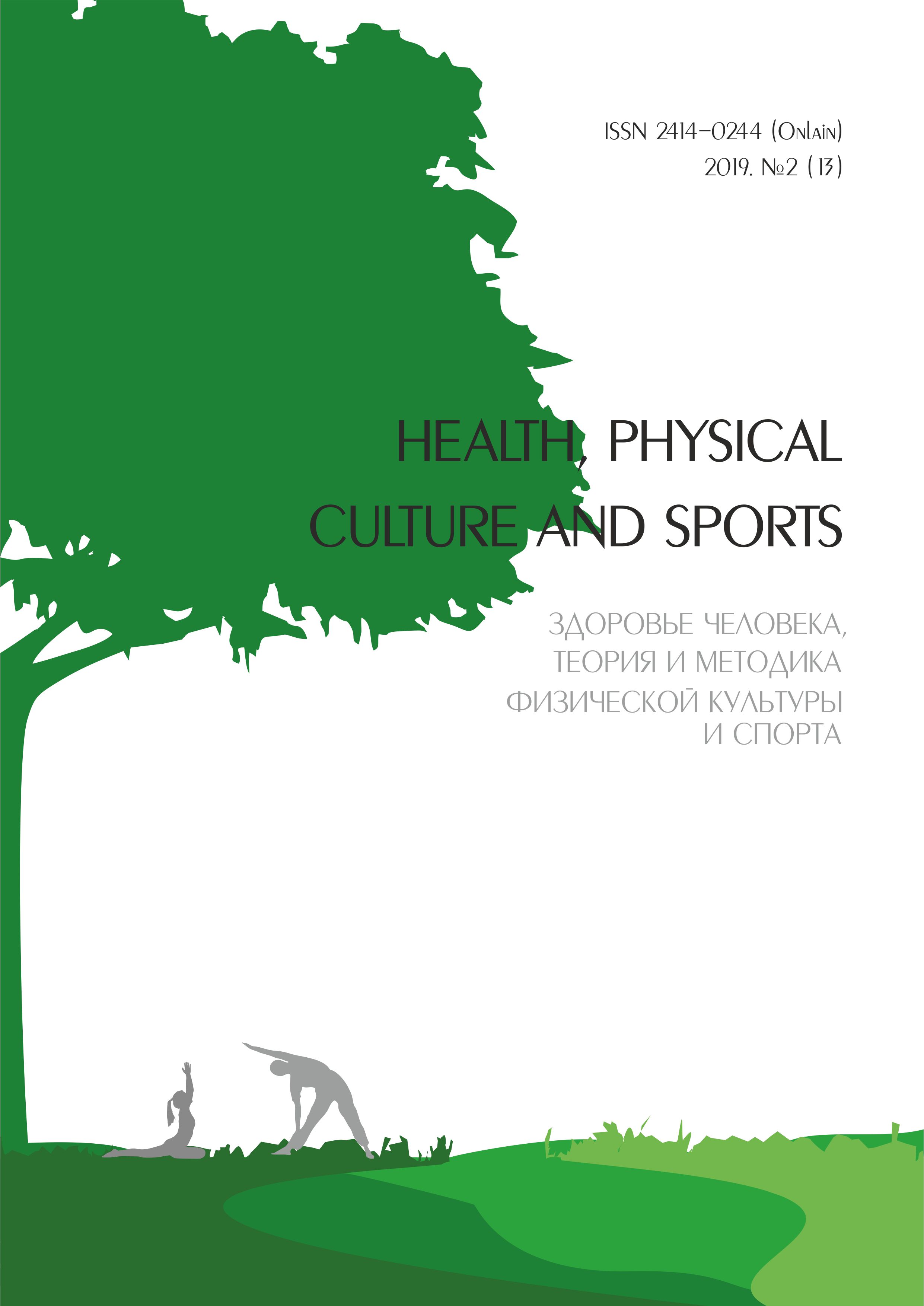Аnalytical assessment of the regime moments of elementary school students
Abstract
The article presents information on the formation of the main regime moments of pupils in the secondary school in the process of adaptation to the new conditions of their life. The aim of the work was to conduct an analytical assessment of the dynamics of changes in the daily regime of schoolchildren studying according to the principles of meritocratic education, living in a large industrial center. Under supervision, there were 89 children, during two years of training. The data were obtained using the “Methodology for assessing the daily regime” for primary school students. The questionnaire contained questions about the organization of the time the child was in school and at home, special attention was paid to such sensitive moments as doing morning exercises, the level of formed brushing skills, the duration of a night’s sleep, the time for outdoor exercise, the duration of homework, visiting sections, extra classes, etc. This article provides indicators that have significant differences in learning dynamics. The results of dynamic observation of students in the process of their adaptation to educational activities are given. The main factors that influence the health of children are identified, including: increased mental load, insufficient physical activity, nutritional deficiencies, disturbances in rest, sleep, and other aspects of living conditions that lead to deviations in children's health and reduced functional body capabilities
Downloads
References
Лук’янова О.М. Проблеми здоров’я здорової дитини та наукові аспекти профілактики його порушень // Мистецтво лікування. 2005. № 2. С. 6–15 (на укр. яз.).
Ben-Shlomo Y., Kuh D. A life course approach to chronic disease epidemiology: conceptual models, empirical challenges and interdisciplinary perspectives // J. Epidemiol. 2002. Vol. 31. P. 285–293.
Яцула М.С., Няньковський С.Л. Синдром шкільної дизадаптації: актуальність проблеми в першокласників // Педіатрія, акушество та гінекологія. 2008. № 1(425). С. 17–19 (на укр. яз.). Мойсеєнко Р.О. Здоров’я дітей шкільного віку та першочергові заходи з метою його поліпшення // Охорона здоров’я України. 2002. №3–4. С. 7–11 (на укр. яз.).
Неділько В.П., Камінська Т.М., Руденко С.А. Шляхи покращення здоров’я школярів // Перинатология и педиатрия. 2006. №1. С. 129–132 (на укр. яз.).
Полька Н.С., Єременко Г.М., Гозак С.В. та ін. Гігієнічні проблеми на початку реформи освіти в Україні // Актуальні питання гігієни та екологічної безпеки України. Киiв, 2002. С. 92–93 (на укр. яз.).
Кучма В.Р., Ткачук Е.А., Ефимова Н.В. Гигиеническая оценка интенсификации учебной деятельности детей в современных условиях // Вопросы школьной и университетской медицины и здоровья. М., 2015. С. 4–11.
Полька Н.С. Гігієнічне забезпечення оптимальних умов життєдіяльності дітей – основа збереження їх здоров’я // Матеріали до круглого столу «Сучасна загальноосвітня школа та репродуктивне здоров’я». Киiв, 2003. С. 22–23(на укр. яз.).
Неділько В.П., Камінська Т.М., Руденко С.А. Шляхи покращення стану здоров’я дітей шкільного віку // Гігієна населених місць. Вип. 44. Киiв, 2004. С. 546–549 (на укр. яз.).
Диниміка стану здоров’я школярів в Україні за даними анкетного опитування / Няньковський С.Л., Яцула М.С., Няньковська О.С., Титуса А.В. // Здоровье ребенка. 2018. № 5. С. 17–24(на укр. яз.).
REFERENCES
Nyankovskyy S.L., Jacula M.S., Chykajlo M.I., Pasechnjuk I.V. 2012. The state of health of schoolchildren in Ukraine. Zdorovʹe rebenka. Vol. 5. P. 109–114 (in Ukrainian).
Luk’janova O.M. 2005. Health problems of a healthy child and scientific aspects of prevention of its violations. Mystectvo likuvannja. Vol. 2. P. 6–15 (In Ukrainian).
Ben-Shlomo Y., Kuh D. 2002. A life course approach to chronic disease epidemiology: conceptual models, empirical challenges and interdisciplinary perspectives. Int. J. Epidemiol. Vol. 31. P. 285–293.
Yacula M.S., Nyan'kovs'kij S.L. 2008. Sindrom shkіl'noї dizadaptacії: aktual'nіst' problemi v pershoklasnikіv. Pedіatrіya, akushestvo ta gіnekologіya. Vol. 1(425). P. 17–19 (in Ukrainian).
Mojseєnko R.O. 2002. Zdorov’ya dіtej shkіl'nogo vіku ta pershochergovі zaxodi z metoyu jogo polіpshennya. Oxorona zdorov’ya Ukraїni. Vol. 4. P. 7–11 (in Ukrainian).
Nedіl'ko V.P., Kamіns'ka T.M., Rudenko S.A. 2006. Shlyaxi pokrashhennya zdorov’ya shkolyarіv. Perinatologiya i pediatriya. Vol.1. P. 129-132 (in Ukrainian).
Pol'ka N.S., Eremenko G.M., Gozak S.V. ta іn. 2002 Gіgіenіchnі problemi na pochatku reformi osvіti v Ukrainі. Aktual'nі pitannya gіgіeni ta ekologіchnoi bezpeki Ukraini. K., P. 92-93 (in Ukrainian).
Kuchma V., Tkachuk E., Efimova N. 2015. Hygienic assessment of the intensification of educational activity of children in modern conditions. Voprosy shkol'noj i universitetskoj mediciny i zdorov'ya. M., P. 4–11 (in Russian).
Pol'ka N.S. 2003. Gіgіenіchne zabezpechennya optimal'nix umov zhittedіyal'nostі dіtej — osnova zberezhennya ix zdorov’ya. «Suchasna zagal'noosvіtnya shkola ta reproduktivne zdorov’ya». K. P. 22–23 (in Ukrainian).
Nedіl'ko V.P., Kamіns'ka T.M., Rudenko S.A. 2004. Shlyaxi pokrashhennya stanu zdorov’ya dіtej shkіl'nogo vіku. Gіgіena naselenix mіsc'. Vol. 44. P. 546–549 (in Ukrainian).
Nyankovskyy S.L., Yatsula M.S., Nyankovska O.S., Tytusa A.V. 2018. The dynamics of the health of schoolchildren in Ukraine according to the questionnaire. Zdorov'e rebenka. Vol.5. P. 17–24 (in Ukrainian)
Copyright (c) 2019 Health, physical culture and sports

This work is licensed under a Creative Commons Attribution-NonCommercial 4.0 International License.
An author should not normally publish manuscripts describing essentially the same research in multiple journals or publication venues. Such redundant publication is generally considered to constitute unethical publishing behavior, and if discovered may result in a manuscript under consideration being rejected, or a published article being retracted.
Authors of manuscripts reporting on original research should present an accurate account of the work performed, accompanied by an objective discussion of its significance. Underlying data should be represented accurately in the manuscript. The manuscript should contain sufficient detail and references to permit others to replicate the work. The fabrication of results and the making of fraudulent or knowingly inaccurate statements constitute unethical behavior and may be cause for rejection or retraction of a manuscript or published article.





